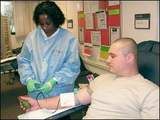Soldiers sidelined from donor tables
Soldiers sidelined from donor tables
By CHANTAL ESCOTO
The Leaf-Chronicle

Adrienne Baker, a blood specialist with Blanchfield Army Community Hospital, takes blood from Spc. Dalton Jeffords during a recent Army Services Blood Program drive at BACH. The blood collected goes to those serving in combat.
For 20,000 soldiers with the 101st Airborne Division who just returned from Iraq, giving blood is not an option right now.
According to the Army Blood Program, anyone who has served in Iraq cannot give blood for at least a year after their return to the United States. This leaves only the civilians and those who did not deploy to make up for the donors sent to combat duty.
During a recent blood drive at Fort Campbell's Blanchfield Army Community Hospital, blood technician Adrienne Baker said the traffic was steady, but she had to turn away some potential donors. "We had a few deferrals because they were deployed or lived in Iraq," Baker said.
But soldiers like Spc. Dalton Jeffords, 21, a medic who works in the hospital and didn't deploy, said donating blood is second nature.
"It was purely by choice. I feel it's important to give blood whenever I can and help my fellow soldiers," Jeffords said. "You never know — it could be me who may need it."
All of the blood collected through the Armed Services Blood Program is sent overseas to combat zones and military treatment facilities for use by soldiers and their families. The majority of the donated blood goes to support operations in Iraq and Afghanistan.
"I've got friend deployed to Iraq right now," Jeffords said.
Capt. Phillip Rooks, BACH laboratory manager, said soldiers who deployed to Iraq must wait to donate blood to ensure any possible parasites contracted during the deployment clear the body. "There is an incubation period," he said. Rooks said the loss of potential donors cripples the program at a time when blood is needed most around the holidays.
Moreover, once the soldiers do become eligible to donate blood, they'll likely have to deploy again. This is why it's up to civilians and BACH personnel to give blood whenever possible "We depend a lot on the civilian support staff," he said.
Chantal Escoto covers military affairs and can be reached by telephone at 931-245-0216 or by e-mail at chantalescoto@theleafchronicle.com










1 Comments:
You can find information about the Armed Services Blood Program and locate the closest place to donate at http://www.militaryblood.dod.mil. Check it out - it is the best way to really 'support the troops!'
Post a Comment
<< Home